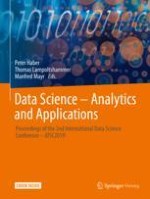2019 | OriginalPaper | Chapter
Using supervised learning to predict the reliability of a welding process
Authors : Melanie Zumtobel, Kathrin Plankensteiner
Published in: Data Science – Analytics and Applications
Publisher: Springer Fachmedien Wiesbaden
Activate our intelligent search to find suitable subject content or patents.
Select sections of text to find matching patents with Artificial Intelligence. powered by
Select sections of text to find additional relevant content using AI-assisted search. powered by
Abstract—In this paper, supervised learning is used to predict the reliability of manufacturing processes in industrial settings. As an example case, lifetime data has been collected from a special device made of sheet metal. It is known, that a welding procedure is the critical step during production. To test the quality of the welded area, End-of-Life tests have been performed on each of the devices.For the statistical analysis, not only the acquired lifetime, but also data specifying the device before and after the welding process as well as measured curves from the welding step itself, e.g., current over time, are available.Typically, the Weibull and log-normal distributions are used to model lifetime. Also in our case, both are considered as an appropriate candidate distribution. Although both distributions might fit the data well, the log-normal distribution is selected because the ks-test and the Bayesian Factor indicate slightly better results.To model the lifetime depending on the welding parameters, a multivariable linear regression model is used. To find the significant covariates, a mix of forward selection and backward elimination is utilized. The t-test is used to determine each covariate’s importance while the adjusted coefficient of determination is used as a global Goodness-of-Fit criterion. After the model that provides the best fit has been determined, predictive power is evaluated with a non-exhaustive cross-validation and sum of squared errors.The results show that the lifetime can be predicted based on the welding settings. For lifetime prediction, the model yields accurate results when interpolation is used. However, an extrapolation beyond the range of available data shows the limits of a purely data-driven model.
